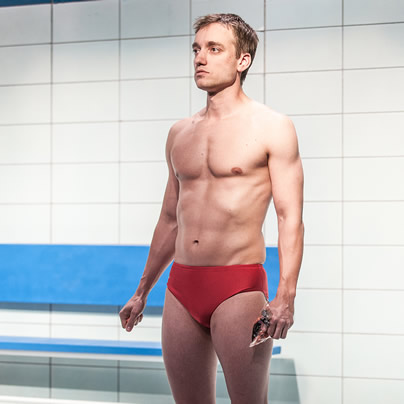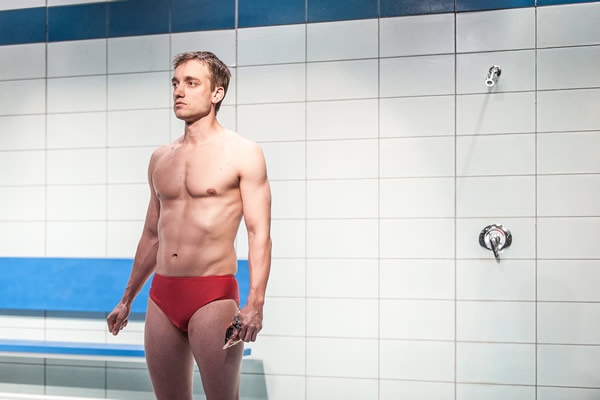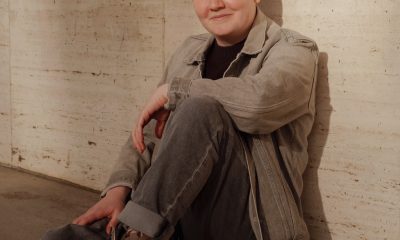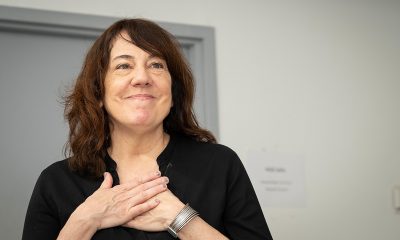Arts & Entertainment
Weight of the world
New ‘Speedo’ explores high stakes of Olympic competition


Frank Boyd as Ray in ‘Red Speedo.’ (Photo by Teddy Wolff; courtesy Studio Theatre)
‘Red Speedo’
Through Oct. 13
Studio Theatre
14th & P Streets, NW
$20
202-332-3300
Did he, or didn’t he? Will he, or won’t he? There’s a lot riding on Olympic swimming hopeful Ray’s actions. His every move ripples with ramifications for those closest to him. “Red Speedo,” Lucas Hnath’s new play at Studio Theatre, considers the high stakes of elite athletics and the pressure to win.
Tightly drawn, the 80-minute play takes place over a tense 24 hours. It starts on the eve of Ray’s Olympic qualifying meet. Performance-enhancing drugs have been discovered in the swim club’s refrigerator. Whose they are is unclear (at this point), but even the taint of mere association with the verboten synesthetic testosterone could put the kibosh on Ray’s swimming future and kill the lucrative endorsement deal he has pending with Speedo.
Not just Ray is invested in his future. Though not altogether clear on his argument, Ray’s older brother Peter (Thomas Jay Ryan) definitely has an agenda. As a lawyer and Ray’s self-appointed manager, he’s determined for Ray to succeed at all costs. Peter is intent on becoming a sports manager and that rests on Ray making it to the Olympics. Then there’s Ray’s longtime unnamed coach (Harry Winter). At first, coach seems judiciously disinterested, but it soon becomes clear that he’s counting heavily on his best swimmer to take them to the Olympics without juicing (or at least without anybody knowing about it).
Behind the blank stare and slightly agape mouth, Ray (the excellent Frank Boyd) is in fact dim — but not entirely so. When it comes to getting his way, Ray possesses a formidable single-mindedness, prompting him to fiercely go after what he wants, though he’s not always successful. This tenacious drive is revealed when he meets with ex-girlfriend Lydia (Laura C. Harris), a former sports therapist with a history involving selling illegal drugs.
The four-person cast is top notch with each actor effectively conveying both their characters’ unlikable aspects and vulnerabilities. They handle the work’s darker and lighter moments with equal skill, particularly Ryan as the almost likable but somewhat sleazy Peter, and Boyd as stolid Ray (who, by the way, looks great in the red Speedo that wears throughout the play).
Presented by the Studio Lab, “Red Speedo” is a stripped-down world premiere production with affordable tickets (just $20). The program allows playwrights in residence to experiment and collaborate on the work. Though already thought provoking and witty, Hnath’s play could benefit from a subtler more nuanced ending, and likely the author will make changes during the process. But even at this stage nothing looks or feels low budget about the production thanks to Lila Neugebauer’s able staging, the impressive cast and a terrific design team including Mimi Lien whose brightly lit set boasts real tiles, authentic pool ceiling lights, a big pace clock and working showers. She’s even managed to make Studio’s upstairs space smell like chlorine.
“We all do things that are sort of good and sort of not so good,” says Ray munching away at a bag of baby carrots. This sort of sums it all up. And along the way, Hnath asks the audience how far we might go in doing some “not so good” things in pursuit of fame, glory or just a modicum of security. It’s hard to say.

Team DC, the umbrella organization for LGBTQ-friendly sports teams and leagues in the D.C. area, held its annual Night of Champions Awards Gala on Saturday, April 20 at the Hilton National Mall. The organization gave out scholarships to area LGBTQ student athletes as well as awards to the Different Drummers, Kelly Laczko of Duplex Diner, Stacy Smith of the Edmund Burke School, Bryan Frank of Triout, JC Adams of DCG Basketball and the DC Gay Flag Football League.
(Washington Blade photos by Michael Key)




















The 2024 National Cannabis Festival was held at the Fields at RFK Stadium on April 19-20.
(Washington Blade photos by Michael Key)
















Covering the @NatlCannaFest at RFK Stadium for @WashBlade . Stop by the LGBTQ+ booth and pick up a paper if you are here. pic.twitter.com/is7hnsaPns
— Michael Patrick Key (@MichaelKeyWB) April 20, 2024
Theater
‘Amm(i)gone’ explores family, queerness, and faith
A ‘fully autobiographical’ work from out artist Adil Mansoor

‘Amm(i)gone’
Thorough May 12
Woolly Mammoth Theatre
641 D St., N.W.
$60-$70
Woollymammoth.net
“Fully and utterly autobiographical.” That’s how Adil Mansoor describes “Amm(i)gone,” his one-man work currently playing at Woolly Mammoth Theatre.
Both created and performed by out artist Mansoor, it’s his story about inviting his Pakistani mother to translate Sophocles’s Greek tragedy “Antigone” into Urdu. Throughout the journey, there’s an exploration of family, queerness, and faith,as well as references to teachings from the Quran, and audio conversations with his Muslim mother.
Mansoor, 38, grew up in the suburbs of Chicago and is now based in Pittsburgh where he’s a busy theater maker. He’s also the founding member of Pittsburgh’s Hatch Arts Collective and the former artistic director of Dreams of Hope, an LGBTQ youth arts organization.
WASHINGTON BLADE: What spurred you to create “Amm(i)gone”?
ADIL MANSOOR: I was reading a translation of “Antigone” a few years back and found myself emotionally overwhelmed. A Theban princess buries her brother knowing it will cost her, her own life. It’s about a person for whom all aspirations are in the afterlife. And what does that do to the living when all of your hopes and dreams have to be reserved for the afterlife?
I found grant funding to pay my mom to do the translation. I wanted to engage in learning. I wanted to share theater but especially this ancient tragedy. My mother appreciated the characters were struggling between loving one another and their beliefs.
BLADE: Are you more director than actor?
MANSOOR: I’m primarily a director with an MFA in directing from Carnegie Mellon. I wrote, directed, and performed in this show, and had been working on it for four years. I’ve done different versions including Zoom. Woolly’s is a new production with the same team who’ve been involved since the beginning.
I love solo performance. I’ve produced and now teach solo performance and believe in its power. And I definitely lean toward “performance” and I haven’t “acted” since I was in college. I feel good on stage. I was a tour guide and do a lot of public speaking. I enjoy the attention.
BLADE: Describe your mom.
MANSOOR: My mom is a wonderfully devout Muslim, single mother, social worker who discovered my queerness on Google. And she prays for me.
She and I are similar, the way we look at things, the way we laugh. But different too. And those are among the questions I ask in this show. Our relationship is both beautiful and complicated.
BLADE: So, you weren’t exactly hiding your sexuality?
MANSOOR: In my mid-20s, I took time to talk with friends about our being queer with relation to our careers. My sexuality is essential to the work. As the artistic director at Dreams of Hope, part of the work was to model what it means to be public. If I’m in a room with queer and trans teenagers, part of what I’m doing is modeling queer adulthood. The way they see me in the world is part of what I’m putting out there. And I want that to be expansive and full.
So much of my work involves fundraising and being a face in schools. Being out is about making safe space for queer young folks.
BLADE: Have you encountered much Islamophobia?
MANSOOR: When 9/11 happened, I was a sophomore in high school, so yes. I faced a lot then and now. I’ve been egged on the street in the last four months. I see it in the classroom. It shows up in all sorts of ways.
BLADE: What prompted you to lead your creative life in Pittsburgh?
MANSOOR: I’ve been here for 14 years. I breathe with ease in Pittsburgh. The hills and the valleys and the rust of the city do something to me. It’s beautiful, it’ affordable, and there is support for local artists. There’s a lot of opportunity.
Still, the plan was to move to New York in September of 2020 but that was cancelled. Then the pandemic showed me that I could live in Pittsburgh and still have a nationally viable career.
BLADE: What are you trying to achieve with “Amm(i)gone”?
MANSOOR: What I’m sharing in the show is so very specific but I hear people from other backgrounds say I totally see my mom in that. My partner is Catholic and we share so much in relation to this.
I hope the work is embracing the fullness of queerness and how means so many things. And I hope the show makes audiences want to call their parents or squeeze their partners.




















